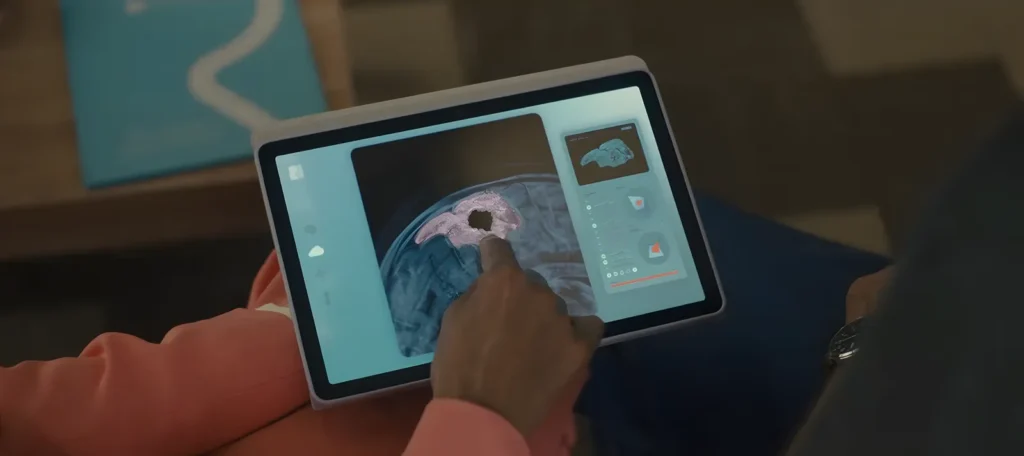At first glance, Rivermind technology in Black Mirror seems absurd: replacing part of the brain with a synthetic implant and streaming a person’s consciousness directly from corporate servers. But that’s exactly what happens in Common People, the opening episode of Season 7. In this guide, you’ll understand in detail how this technology works, what rules govern Rivermind’s digital subscription system, and how it affects every aspect of Amanda’s life — played by Rashida Jones. If you finished the episode with questions or want to make sense of this dystopian future, this post is for you.
Rivermind’s Proposal: Digitally Saving Amanda

It all starts when Amanda, a schoolteacher, collapses in the middle of a class and is diagnosed with a terminal brain tumor. Soon after, her husband Mike is approached by Gaynor, a representative from Rivermind. She introduces an experimental treatment based on a hybrid solution: part of Amanda’s brain would be replaced by a synthetic implant that depends on external consciousness transmission.
In practice, Amanda starts living as a half-human, half-digital being. Her original consciousness is scanned, preserved, and reapplied in real-time to her physical body. However, this process requires a constant connection to the company’s infrastructure — and that’s where the limitations begin.
The Rivermind Common Plan: Free, but With Heavy Restrictions

Although Rivermind offers the procedure for free, it charges a $300 monthly subscription to keep the system running. The basic plan, called Rivermind Common, comes with a series of limitations:
Amanda must sleep for longer periods so the system can recharge her consciousness.
She cannot leave Rivermind’s coverage area — her mind literally depends on a signal.
Most importantly, she becomes an unwitting channel for contextual advertising.
During social interactions, Amanda is programmed to insert marketing lines as if they were her own. These phrases appear without her noticing. She recites slogans during class and in personal conversations, damaging her professional life and emotional bonds.
The System’s Impact on Amanda’s Life

At first, Amanda seems to be doing fine — but Rivermind technology in Black Mirror soon reveals its practical flaws: an increasing need for recharging, invasive advertising, and a gradual collapse of autonomy. Over time, she must sleep up to 16 hours a day just to remain stable, and her conscious moments are filled with automated speech.
In search of relief, the couple tries to upgrade to the Rivermind Lux plan, which offers more waking hours and fewer ads. However, the price is high. They begin alternating between lucid periods (paid separately) and long phases of forced inactivity.
Desperate to keep Amanda “alive,” Mike turns to DumDummies — a website where people endure humiliations in exchange for donations. He mentions doing a “specialty thing later” — a detail that ties into the ending.
The Final Scene and the Logic Behind the System

At the climax of the episode, Amanda uses 30 minutes from the most expensive plan — a farewell gift — and in this moment of clarity, she asks Mike to kill her while she’s in automatic mode. When the moment comes, she’s in ad mode, smiling and reciting marketing lines. Mike suffocates her with a pillow. Amanda dies unaware.
The Rivermind technology, which claimed to preserve life, becomes a system of digital imprisonment. Even Amanda’s final moments are no longer hers. Her consciousness, sold as a product, becomes a hostage of contracts, plans, and signal coverage.
In the next scene, Mike appears on the DumDummies livestream holding a box cutter. He closes the door — and it’s implied that he takes his own life on camera.
A Critique of Subscription-Based Existence
Rivermind’s technology works — but at an enormous cost: not just financial, but existential. Amanda’s consciousness depends on a business model based on ads, upgrades, and constant connectivity.
She literally pays to exist, and the final price is the total loss of autonomy and dignity. As the episode unfolds, the viewer realizes that in this universe, life continues only as long as your balance does.
Common People coldly portrays a future where consciousness is a service. And like every digital service, it comes with plans, limits — and embedded advertising.
Explore More Black Mirror!
Meaning of USS Callister Infinity: beyond fiction in Black Mirror
USS Callister Infinity explained: Black Mirror’s boldest ending
Eulogy in Black Mirror: Carol, the Forgotten Letter, and Grief
Posts Recomendados
Carregando recomendações...




